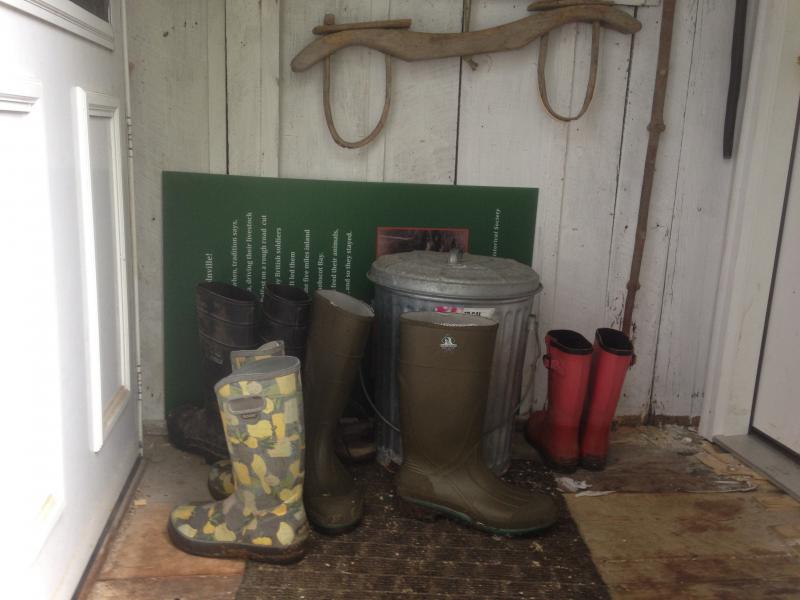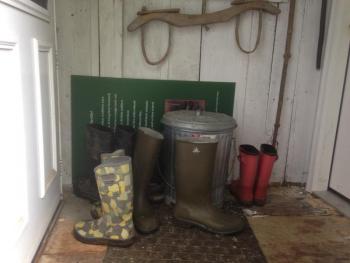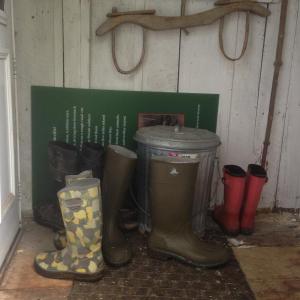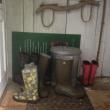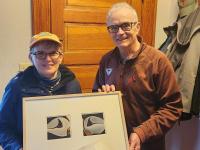This Week in Lincolnville: Choosing Commitment
I wish I’d kept a journal. Ralph Richards, rural mailman, did; he wrote five lines every day, 1908 to the day he died in the 1960s. So did Arno Knight, though he was a real writer, filling a whole page in every one of seventy little leather-bound diaries, one for every year, 1871-1942.
Mabel Athearn’s record of her years as a farm wife in the 1940s ticked off her chores and the comings and goings of her family: “May 1941 – Martin plowed for Will Thayer. Overcast. I dug dandelion greens. Am half sick with a cold and tired. Had a nap in p.m. Churned in Eve. Had 12 lbs. Made a chocolate cake. Emma and Ralph over.”
I do have notebooks full of musings and complaints, written sporadically throughout my marriage, the things I needed to tell him, but wouldn’t – “naval gazing,” Wally would have called it – but no clear record of what we were actually doing. I wish I’d recorded the important stuff – how many packages of frozen beans, how many pounds of garlic, how many chicks ordered, what year we built the hen house, the wood shed, the sauna. Who came for those summer family gatherings. Who stopped by for a dooryard visit?
And how many pounds of butter did I churn?
It came to me yesterday afternoon, standing at a sink full of chickens. Out in the hen yard four adults and one very helpful child had been dispatching these birds, dipping, plucking, and gutting them before delivering them to me in the kitchen. Nine chickens to pick and clean, floating in my huge slate sink, and I feel a bit overwhelmed. Didn’t we, Wally and I, do 25 in a day, just the two of us? It seems impossible, but I know we did. And were roundly outdone by a Searsmont couple we knew who did 75.
The bigger question is why, why did we, for all the years of our marriage, raise chickens, keep a milk cow, pigs, geese, as well as numerous cats, always a dog or two, even tropical fish?
“You must never have to go to the grocery store,” people say, looking at our garden, even today when I’m down to a flock of hens, the aforesaid 9 meat birds, one dog, one cat and a cockatiel.
Back in the beginning I got one of those farm accounting books from the Extension people and recorded every bill from the Camden Farmers’ Union, balanced by how much milk we sold, how many pounds of chicken in the freezer, etc. I wasn’t through one summer before it was pretty clear we’d be better off just going to the grocery store.
CALENDAR
MONDAY, July 23
Schoolhouse Museum Open, 1-4 p.m., LIA building, 33 Beach Road
Selectmen meet, 6 p.m., Town Office
TUESDAY, July 24
Needlwork Group, 4-6 p.m.., Library
Lakes and Ponds Committee, 7 p.m., Town Office
WEDNESDAY, July 25
Schoolhouse Museum Open, 1-4 p.m., LIA building, 33 Beach Road
MCSWC Board of Directors, 7 p.m., Camden Town Office
THURSDAY, July 26
Soup Café, Noon-1 p.m., Community Building
FRIDAY, July 27
Writing Group, 9 a.m., Library
Schoolhouse Museum Open, 1-4 p.m., LIA building, 33 Beach Road
SUNDAY, July 29
North Cobbtown Road Cemetery Tour, 1 p.m., meet between 9th and 10th Avenues
Old Time Summer Picnic and Auction, 5 p.m., Lincolnville Boat Club, 209 Main Street
EVERY WEEK
AA meetings, Tuesdays & Fridays at 12:15 p.m., Wednesdays & Sundays at 6 p.m., United Christian Church
Lincolnville Community Library, open Tuesdays 4-7, Wednesdays, 2-7, Fridays and Saturdays, 9 a.m.-noon. For information call 706-3896.
Soup Café, every Thursday, noon—1p.m., Community Building, Sponsored by United Christian Church. Free, though donations to the Community Building are appreciated
Schoolhouse Museum open Monday-Wednesday-Friday, 1-4 p.m.
Bayshore Baptist Church, Sunday School for all ages, 9:30 a.m., Worship Service at 11 a.m., Atlantic Highway
United Christian Church, Worship Service 9:30 a.m., Children’s Church during service, 18 Searsmont Road
Obviously we needed a better rationale, because by then we were hooked. We loved our life, the routine – up at 4, muck out the cow, feed the pigs and hens, and milk by 5:30, he off to work, me in the kitchen with a bucketful of warm milk, bread rising by the stove, and eventually three little boys, whichever was the youngest with that early morning damp diaper smell, milling around underfoot.
We’d decided, or rather both of us assumed, that I would stay home with the house and the boys; I’d quit my teaching job in Rockland at the end of the school year, 1971, pregnant with our first.
He was the teaching principal at the four-room Lincolnville Central School, which in those years had Hope and Lincolnville students in grades 5-8; grades 1-4 were sent to Hope. He taught science and math, with 37 students one year in the eighth grade. He stayed there 6 years, until the year our first was starting school, when he returned to the Adams School in Castine where he’d taught before we were married.
By the second summer in our house at the top of Sleepy Hollow we thought we were old hands at this livestock thing. The two ducklings he’d brought home the year before had grown into handsome ducks – Hekyl and Jekyl, which we’d both agreed to eat – eventually. But when the day came and I could only see Jekyl in the front yard I went around back calling “Hekyl! Hekyl!” only to come face to face with my husband holding an ax.
Oh.
The lesson we both learned was to never name ‘em.
When we saw a sign over on Tucker Brook Road “bantams for sale” we stopped and met Agnes Underhill, who sold us her flock of little chickens for $15. Two goats followed, then the triplets one of them bore, a couple of piglets, and always a pair or two of geese. When the goats proved impossible to keep out of the garden and someone told us a cow was way easier, we traded up to Molly, a Guernsey then living in a barn at Simonton Corner.
We weren’t alone. Here and there around the Midcoast, especially in Appleton, Searsmont and Hope where land was cheaper than on the coast, young couples were buying old farmhouses or parcels of land and putting up with their own hands simple houses they’d learned to build at Shelter Institute or from back-to-the-land publications that proliferated in the 70s and 80s. There were even a couple of genuine communes here and there, though we only heard of them.
We stayed close, very close, to home. Anyone with a cow that needs milking twice a day knows that. Sometimes we wondered what we were doing, or rather, why we were doing it. We actually never discussed it much; by the time our second son was born (New Year’s day, 1975) there was nothing to talk about. This was our life, and whatever inconvenience it caused us, well, we just dealt with it.
We felt the commitment that a barnful of animals brought was good for us. It bonded us to home, to each other, to our sons. The boys never complained about the way we lived, the wood they had to carry, the isolation from neighbors, the trips we never took – although there was some grousing about the food.
“Black bean soup again??” “Not Egg Foo Yuck?!” The crumbly whole wheat bread their mother had ground and baked with her own hands. One son to this day has an aversion to all things custardy – quiche was a standard in a house with an abundance of milk and eggs, and he’s never gotten over it.
The chores – gardening or animals – were all ours. We knew plenty of folks who grew up on farms who hated the life, for instance the guy who remembered having to hoe all the beans before he could play ball with his friends. We decided that since we were doing this voluntarily we wouldn’t impose it on our kids. They happily worked for other people from a young age, mowing and gardening, washing windows, stacking wood and walking dogs, getting paid and praise from someone other than Mom and Dad. I’ve always been grateful for these people who hired our young sons and had the patience to teach them how to work.
The Searsmont couple who processed 75 chickens that long ago summer day and most of the other back-to-the-landers threw in the towel decades ago. Divorce, kids (sometimes it took that first baby for the folly of living without running water to sink in), the lure of a real job somewhere else; it all drew them away. There are only a few of us originals left.
Memory, I’ve come to realize, is not only selective, but in telling and re-telling a tale, a particular version of that tale becomes the truth. If I say often enough that we put 25 chickens in the freezer on a given day, then we did.
Tillman Crane’s Photography Workshop
This is the week you’re likely to run across a photographer focusing in on our town. This is a week-long photographic workshop with the purpose of recording life in Lincolnville, Summer 2018. Tillman Crane, known for his platinum prints of his black and white images, has organized this week with some 10 amateur photographers from around the country. The results of their work will be seen during the Center Meeting House’s (United Christian Church) 2020 bicentennial year.
North Cobbtown Road Cemetery Tour
Sunday, July 29 at 1 p.m. Corelyn Senn will lead a tour of North Cobbtown Road’s two cemeteries – the Drinkwater-Field cemetery and the Delano grave/cemetery. The occupant of the Delano grave is the mysterious “Willie” whom Corelyn has been researching for the past dozen years. Come for the stories and the walk
Meet at 1:00 on North Cobbtown Road between 9th and 10th Avenues. If it’s raining the walk will be postponed until August 5. Contact Corelyn for more information, 789-5139 or email.
Library
Needlework Tuesday is this week, July24, 4-6 p.m., and Sheila’s Writing Group is at 9 a.m. on Friday the 27th.
Sunday the Library’s annual Old Time Summer Picnic and Auction will be held at the Lincolnville Boat Club, 209 Main Street across from the Library. The menu includes pulled pork or veggie beans, fresh rolls, summer salads, watermelon, homemade cookies and lemonade. Adults - $10, children - $5, under 4 and over 90 – Free.
After supper stay for the entertainment: a Rosey Gerry auction. This year’s items include gift certificates to Long Grain, Drouthy Bear, Whales Tooth Pub, and Chez Michel, Siem van der Venn pottery, scenic airplane ride, 10# blueberries, artwork, and lots more.
Proceeds help support our town’s Library. Hope to see everyone there. It’s always a fun evening!
Concerning Sidewalks
People in the Center are starting to think about a sidewalk through their part of town. A group met recently to walk and talk about the possibilities. Millard Eugley remembers when there was a gravel sidewalk that went from the fire station (now the Boat Club) to the corner by the General Store. Each homeowner maintained their own stretch of sidewalk.
Another Diary
Here’s a small diary found at a flea market or perhaps in an old drawer. There’s no indication whose it was, but from the names it was written by someone living at Lincolnville Beach. It’s dated 1925. Corelyn Senn transcribed it.
Saturday, Feb 21-Went up to the mountain and hauled out two loads of wood. In the afternoon dug a pail of clams. Masquerade at the hall did not go
Sunday Feb 22-Went clamming with Raymond and Amos and Lloyd Pitcher got about half a bushel of large clams
Monday, Feb 23-Went fox hunting with Stanton Collemer and Amos Pitcher down back of the Decrow place [next to Bayshore Baptist Church], Rained hard, got soaking wet
Tues Feb 24--Went fox hunting with Harry Richards and Will Young. Down over Bald Rock. afternoon worked on the cellar drain.
Weds Feb 25--Sawed wood all day
Thursday Feb 26--Worked on cellar drain in the AM. Sawed wood after dinner. Rained.
Friday Feb 27--Painted Roy's wagon wheels and got them ready to paint. Hauled load of logs from the mountain. Amos Pitcher helped me haul two loads of wood from Mr Thomas's pasture.
Saturday, Feb 28--Earthquake at 9.25 P.M. was in Nichols garage [Beach Store] at time care moved on floor, the gasoline slopped in the tanks. Saw Mr.F.M. Willis of the Great Atlantic and Pacific Tea Co.
Sunday, March 1 --snow-- Went up to Nichols. Has supper at Frank Collemer's [second house north of Chez Michel]
Monday, March 2--Went to school rather uneventful.
Wednesday--May 6-- Geo Nichols 223-1533 off. E. Keene - 50 foot boards Geo Nichols - 60 ft boards
Event Date
Address
United States

